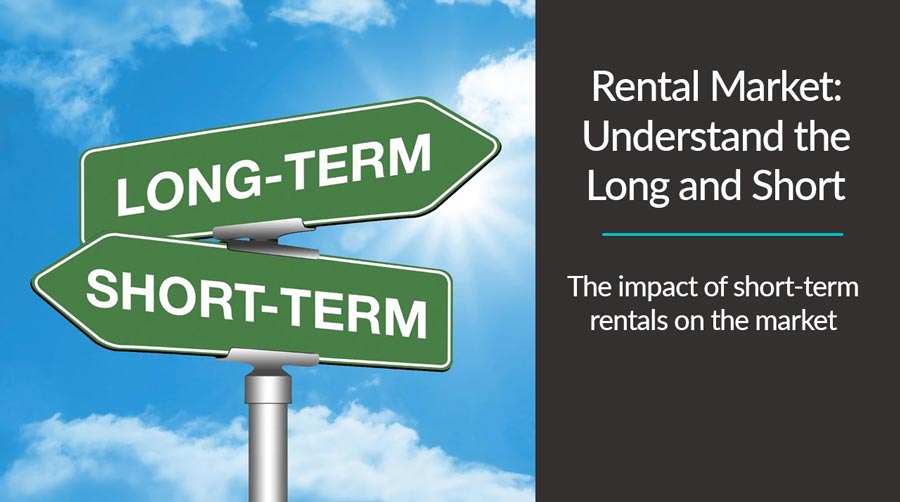
Rental Market: Understand Long- and Short-Term Rentals
Are you thinking of getting into rental property investing, enticed by the growing popularity of short-term or vacation rentals? Short-term rentals offer the opportunity for high returns on your investment, but they also come with certain drawbacks. If you’re leaning toward purchasing additional property for a short-term rental, make sure to do your homework: There are tradeoffs you might not have considered that may make the short-term rental option less appealing. Here’s the lowdown on the good, the bad, and the uncertainty of investing in short-term property rentals.
The Good
The biggest reason property investors are jumping on the short-term rental bandwagon is the high rents they can charge. Instead of a monthly rate of $1,500, you may be able to charge tourists or business travelers that amount for a week. Also on the plus side, you’re not stuck for six, nine, or 12 months with a problem resident or one who is consistently late paying rent. And instead of simply hoping your residents are taking proper care of your investment and you doing an inspection when they move out, with short-term renters continually turning over, you have the opportunity to keep a close eye on your property and keep up with needed repairs and maintenance.
Short and long-term rentals provide many tax deductions, such as advertising and operating expenses, and when the home is vacant, you can offer perks to friends and family by letting them occupy the unit.
The Bad
Because of the constant turnover, short-term rental properties require a lot more management. Ongoing marketing and advertising costs can take a hefty bite out of your profits, as can associated taxes, licenses, inspections, and permits. You will also need to provide household amenities such as towels, toilet paper, bedding, and utilities, and perhaps perks such as bicycles, boats, or hot tubs that will make your property stand out from the competition, according to the Market Ready blog article. For example, in Miami, you pay a collective tax on short terms rentals of 14% and if you get caught not doing it the fines can be in the tens of thousands of dollars.
Short-term rentals may drive down the value of your property and surrounding properties due to the transient residents, parking problems, and increased traffic and noise in the area. Because of these issues, some cities or homeowners associations are regulating or banning short-term rentals altogether, so do your research prior to investing. In addition be prepared to receive calls from all your neighbors, like all the time.
The Uncertainty
Unlike long-term property rentals, short-term rentals have continual turnover, which means a high level of uncertainty. You need to constantly market and promote your property to make sure it is always occupied. A few weeks of vacancy can seriously eat into your rental income. Also, because of the potential for a city or neighborhood to suddenly decide to regulate or restrict short-term rentals, you never know when you might have to divest.
Although more and more business travelers and vacationers are making short-term rentals a popular option and a potentially lucrative investment opportunity, the costs and risks of this type of investing aren’t suitable for everyone. It takes careful research and analysis to mitigate the risks. Typically, the tried-and-true method of wealth-building through a portfolio of long-term rental property investing is the best way to ensure your long-term financial future.
How to Limit Resident Turnover
Summertime is a common time for rental leases to end, which often leads to a high turnover rate. This creates a busy and stressful time for property owners and landlords who have to inspect and make repairs on their properties as well as market them to fill any vacancies. The costs of high turnover can be substantial, and property owners need to plan and be prepared to weather the storm.
Turnover costs
When a resident moves out, you could lose that month’s rent — and more if the property is not rented quickly. In addition, you have to spend money and time advertising and promoting your property, doing background checks, verifying employment, showing the property, processing applications, and taking care of other resident-qualification tasks. And then comes rehabbing the property from cleaning, repairing damages, and making the home suitable and appealing to the next residents.
How to reduce turnover
There are situations such as graduations, end-of-academic-year relocations, new jobs, or other life-changing events that cause residents to leave that you have no control over. However, there are circumstances in which you can reduce high turnover at this time of year. Here are some tips to keep your residents for the long term:
It begins with great customer service to the resident. Like any of us as consumers, we stay with that business even if they raise their prices moderately.
- Pay attention to feedback from residents who are moving out. Were they satisfied with the home and the management?
- Keep communication lines open and respond to requests promptly.
- After resident move-out is a good time to upgrade. A fresh coat of paint, new kitchen linoleum, or air conditioning could be just what a potential resident needs to make the decision to sign the lease.
- Many property owners are hesitant to raise rents for fear of causing a resident to move. That’s a mistake. As long as the rental market for comparable properties is strong and you gave the resident great service, go ahead and increase the rent a small percentage at renewal. If you keep residents happy, they will not mind and even expect regular rent renewals.
Although turnover is an inevitable part of rental property investing, you can mitigate the associated costs by showing your residents they are important and respected. A satisfied, happy resident is more likely to become a long-term resident.
So whether you do short or long-term rentals, the resident is paying your property off and in 15 or 30 years your property will be free and clear with you collecting a big check every month.











